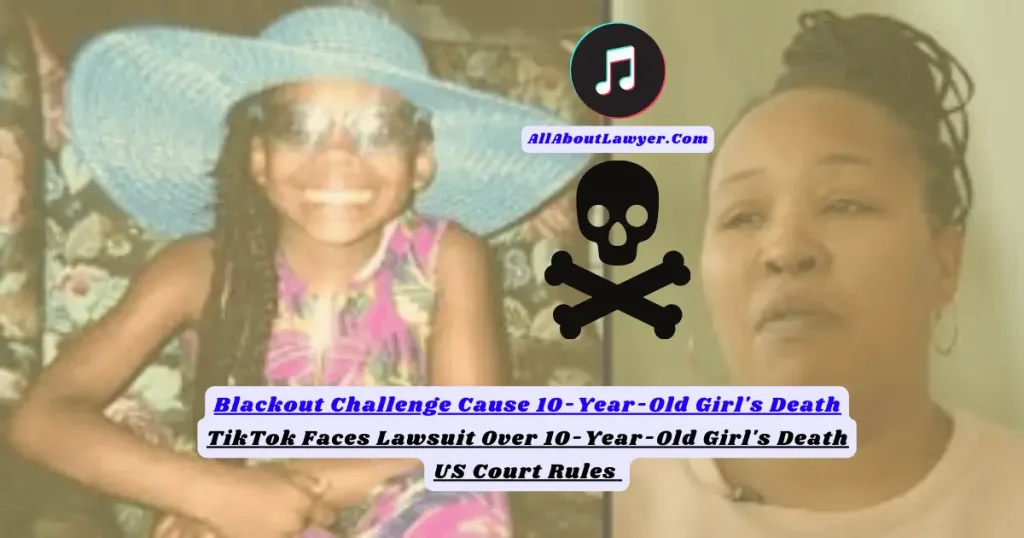Blackout Challenge Cause 10-Year-Old Girl’s Death | TikTok Faces Lawsuit Over 10-Year-Old Girl’s Death US Court Rules
TikTok, the immensely popular social media platform, is now facing a lawsuit following the tragic death of a 10-year-old girl. The incident has brought significant attention to the potential dangers posed by online content, especially to minors. This case highlights the ongoing debate over the responsibilities of social media platforms in safeguarding their users, particularly vulnerable children.
Table of Contents
The Tragic Incident | A Child’s Life Cut Short
The lawsuit stems from a heartbreaking incident where a 10-year-old girl reportedly participated in a dangerous trend known as the “Blackout Challenge,” which she discovered on TikTok. The challenge, which encourages participants to choke themselves until they pass out, led to the young girl’s accidental death. Her parents have filed a wrongful death lawsuit like Mesothelioma Lawsuitagainst TikTok, alleging that the platform’s algorithm promoted harmful content to their daughter.
Aug 28 (Reuters) – A U.S. Appeals Court Revives the Lawsuit
In a significant development, a U.S. appeals court has revived the lawsuit against TikTok by the mother of the 10-year-old girl. The court’s decision marks a crucial turning point in the legal battle, as it challenges the broad legal protections typically afforded to internet companies under Section 230 of the Communications Decency Act of 1996.
The Philadelphia-based 3rd U.S. Circuit Court of Appeals ruled that Section 230, which usually shields internet companies from lawsuits over user-generated content, does not bar Nylah Anderson’s mother from pursuing claims that TikTok’s algorithm specifically recommended the Blackout Challenge to her daughter. This ruling opens the door for further legal scrutiny of TikTok’s role in promoting harmful content to users, particularly minors.
Legal Responsibility and TikTok’s Alleged Negligence
At the heart of the lawsuit is the question of legal responsibility. The plaintiffs argue that TikTok’s algorithm played a crucial role in promoting the dangerous content that ultimately led to their daughter’s death. They claim that TikTok’s negligence in content moderation and failure to implement adequate safety measures contributed to the tragedy.
U.S. Circuit Judge Patty Shwartz, writing for the three-judge panel, emphasized that Section 230 only immunizes platforms for information provided by third parties, not for recommendations made by the platform itself through its algorithm. This interpretation departs from previous court rulings that broadly protected online platforms under Section 230, marking a significant shift in legal thinking.
Judge Shwartz’s ruling was influenced by a recent U.S. Supreme Court decision, which held that a platform’s algorithm reflects “editorial judgments” about the content it chooses to promote. Under this logic, content curation using algorithms is considered the company’s own speech, which is not protected by Section 230.
TikTok, according to Shwartz, “makes choices about the content recommended and promoted to specific users, and by doing so, is engaged in its own first-party speech.” This decision could set a precedent for holding social media companies accountable for the content their algorithms promote, particularly when it leads to harmful consequences.

Parental Concerns and the Role of Social Media
This case has sparked widespread concern among parents about the safety of their children online. The tragic death has intensified discussions around parental control and the effectiveness of content moderation on social media platforms. Many are questioning whether TikTok, and similar platforms, are doing enough to protect minors from harmful content.
The lawsuit highlights the need for parents to be vigilant about their children’s online activities. However, it also raises important questions about the role of social media companies in ensuring the safety of their younger users.
TikTok’s Defense: Corporate Responsibility Under Scrutiny
TikTok has responded to the lawsuit by expressing sympathy for the family but has also defended its practices. The company claims to have robust policies in place to prevent the spread of harmful content and argues that the responsibility for content lies with the users. However, critics argue that these measures are insufficient, particularly when it comes to protecting children.
TikTok did not respond to requests for comment following the recent court ruling. However, the decision to revive the lawsuit puts increased pressure on TikTok and its parent company, ByteDance, to address these allegations.
The outcome of this case could have far-reaching implications for TikTok and other social media platforms. A ruling against TikTok could lead to increased regulation and stricter content moderation policies across the industry.
The Impact of Algorithms: A Double-Edged Sword
Central to the case is the role of TikTok’s algorithm in promoting content. Algorithms are designed to keep users engaged by recommending content that aligns with their interests. However, this case illustrates the potential dangers when harmful content is promoted to vulnerable users.
The lawsuit raises questions about the ethical responsibilities of tech companies in designing algorithms that prioritize user safety. If TikTok is found liable, it could lead to a reevaluation of how algorithms are used in social media platforms.
U.S. Circuit Judge Paul Matey, in a partially concurring opinion with the ruling, criticized TikTok’s “pursuit of profits above all other values.” He argued that the platform may choose to serve children content that emphasizes “the basest tastes” and “lowest virtues,” but it “cannot claim immunity that Congress did not provide.”
This harsh criticism underscores the growing scrutiny of how social media platforms prioritize engagement and profit over user safety, particularly when it comes to vulnerable users like children.
Related Articles For You:
Native Shampoo Lawsuit Controversy Over Product Safety and Misleading Claims
Is Prank Calling Against the Law in the UK?
Body Found in Food Lion Freezer in Raleigh Employee Found Dead in Store Freezer

Public Reaction: Outrage and Demands for Change
The case has garnered significant media attention and public outrage. Many have taken to social media to express their condolences to the family and to demand stricter regulations for platforms like TikTok. Online petitions calling for greater accountability from social media companies have gained traction.
This case is not just about one platform; it is about the broader issue of online safety and the responsibilities of tech companies in the digital age.
Big Tech just lost its ‘get-out-of-jail-free card,'” said Jeffrey Goodman, the mother’s lawyer, in a statement following the appeals court’s decision. This sentiment reflects the growing frustration with the perceived lack of accountability for tech giants.
What This Case Means for the Future of Social Media Regulation
The outcome of this lawsuit could have a lasting impact on the social media landscape. If the court rules against TikTok, it could pave the way for stricter regulations and increased scrutiny of how social media companies manage and moderate content. This could lead to significant changes in how platforms like TikTok operate, particularly in terms of protecting younger users.
The case also underscores the need for a collaborative effort between parents, educators, and tech companies to create a safer online environment for children.
The decision to allow the lawsuit to proceed marks a significant shift in the legal landscape, as it challenges the broad immunity that social media platforms have long enjoyed under Section 230. As the legal battle unfolds, it could set a new precedent for how online platforms are held accountable for the content they promote through their algorithms.
Conclusion
As the legal battle unfolds, the world will be watching closely. The lawsuit against TikTok is more than just a court case; it is a pivotal moment in the ongoing debate about the responsibilities of social media platforms. The tragic death of a 10-year-old girl serves as a stark reminder of the potential dangers that lurk online and the urgent need for stronger safeguards to protect vulnerable users.
FAQs
1. What is the Blackout Challenge?
The Blackout Challenge is a dangerous trend that encourages participants to choke themselves until they pass out. It has been linked to several fatalities, including the death of the 10-year-old girl at the center of this lawsuit.
2. Can social media platforms be held liable for user-generated content?
This case could set a legal precedent regarding the liability of social media platforms for the content shared by their users. The court will determine whether TikTok can be held responsible for the harmful content promoted by its algorithm.
3. How does TikTok’s algorithm work?
TikTok’s algorithm is designed to recommend content based on user preferences and behavior. However, this case highlights the potential risks when harmful content is promoted to vulnerable users.
4. What measures does TikTok have in place to protect minors?
TikTok has policies aimed at preventing the spread of harmful content and protecting younger users. However, the effectiveness of these measures is being called into question in light of this lawsuit.
5. What impact could this case have on the future of social media regulation?
If the court rules against TikTok, it could lead to stricter regulations and increased scrutiny of how social media platforms manage and moderate content, particularly with regard to protecting minors.
About the Author

Sarah Klein, JD, is a licensed attorney and legal content strategist with over 12 years of experience across civil, criminal, family, and regulatory law. At All About Lawyer, she covers a wide range of legal topics — from high-profile lawsuits and courtroom stories to state traffic laws and everyday legal questions — all with a focus on accuracy, clarity, and public understanding.
Her writing blends real legal insight with plain-English explanations, helping readers stay informed and legally aware.
Read more about Sarah
